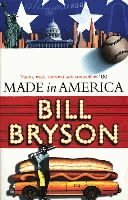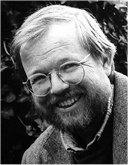
 MADE IN AMERICA by Bill Bryson (hier online bestellen)
MADE IN AMERICA by Bill Bryson (hier online bestellen)
The story:
Similar to Bryson's The Mother Tongue, Made in America also is on language, but not so much
written in a scientific than in a humorous and informal way. The book describes the history of the English
language in North America. Bryson always connects the language with its different people who speak it, thus painting
a vivid picture of both.
The author often touches on commonly held beliefs and exposes or ridicules them. So, he says, the notion of German almost
being declared the national language of the USA, has never been duscussed.
The unique feature of the novel is definitely Bryson's art to combine language with ordinary subjects like
the automobile, food, sexual mores, travel, health or movie. Thus students will find Bryson's book probably
more interesting to read than a dry textbook on langauge only.
About the author:
 Bill Bryson was born in Des Moines, Iowa, in 1951. A backpacking expedition in 1973 brought him to England
where he met his wife and decided to stay. He wrote for the English newspapers
for many years, writing travel articles to enhance his income. He lived with his family in North Yorkshire
before moving back to the States in 1995. He now lives in Hanover, New Hampshire, with his wife and four
children.
Bill Bryson was born in Des Moines, Iowa, in 1951. A backpacking expedition in 1973 brought him to England
where he met his wife and decided to stay. He wrote for the English newspapers
for many years, writing travel articles to enhance his income. He lived with his family in North Yorkshire
before moving back to the States in 1995. He now lives in Hanover, New Hampshire, with his wife and four
children.
The Lost Continent, Bill Bryson's hilarious first travel book, describes a trip in his mother's Chevy around
small town America. Since then, he has written several more about the UK and the US, including
bestsellers, A Walk in the Woods, I'm A Stranger Here Myself (published in Britain as Notes from a Big Country),
and In a Sunburned Country (published in Britain as Down Under).
His other books include Bill Bryson's Dictionary of Troublesome Words, Neither Here nor There: Travels in
Europe, Made in America, The Mother Tongue and Bill Bryson's African Diary. His latest book,
A Short History of Nearly Everything, is available now.
Extract from book:
On Pilgrims:
Okay, first of all, those folks on the 'Mayflower'? Religiously speaking, they weren't Puritans, they were Separatists, and
anyway they called themselves 'Saints'. People who were not Saints they called 'Strangers'. Furthermore, our romantic notion of
their landing on Plymouth Rock is largely based on a poem written in 1826 (two centuries later, you might note) by a Welsh woman who had
never set foot in America. They didn't land on Plymouth Rock itself; and Plymouth was actually their fourth visit ashore,
not their first. So much for that...
Now we have all heard how the local Indians, namely Samoset and Squanto (real name: more like 'Tisquantum') got them
through the first winter by teaching them basic North American agriculture. That much is true. But in case you have ever wondered
how such lessons were communicated, well, the remarkable thing is that these two Indians spoke English. The explorers and wide-ranging fishermen
that had island-hopped their way from the British Isles and Scandinavia had become familiar sights to the East Coast natives by the 1600s. Not quite 'the New World' anymore, even back then.
..........
Probably America's biggest contribution to modern Englsh is the expression 'OK', which can be used as just about
every part of speech. Tracing its origins seems to have been surprisingly difficult, but it was eventually worked out
that 'OK' first appeared in print in 1839, as a jocular abbreviation for 'Oll Korrekt'. This sort of thing was fashionable at the time, apparently.
The Democratic O.K. Club the next year, promoting Martin van Buren ('Old Kinderkook'), helped cement the term.
Buchdaten:
Made in America
Sprache: Englisch
Broschiert - 496 Seiten - Black Swan
Erscheinungsdatum: 2. April 1998
ISBN: 0552998052
Preis: € 13,30
More works from the same author:
zurück zur Übersicht
|
 MADE IN AMERICA by Bill Bryson (hier online bestellen)
MADE IN AMERICA by Bill Bryson (hier online bestellen)
 Bill Bryson was born in Des Moines, Iowa, in 1951. A backpacking expedition in 1973 brought him to England
where he met his wife and decided to stay. He wrote for the English newspapers
for many years, writing travel articles to enhance his income. He lived with his family in North Yorkshire
before moving back to the States in 1995. He now lives in Hanover, New Hampshire, with his wife and four
children.
Bill Bryson was born in Des Moines, Iowa, in 1951. A backpacking expedition in 1973 brought him to England
where he met his wife and decided to stay. He wrote for the English newspapers
for many years, writing travel articles to enhance his income. He lived with his family in North Yorkshire
before moving back to the States in 1995. He now lives in Hanover, New Hampshire, with his wife and four
children.



